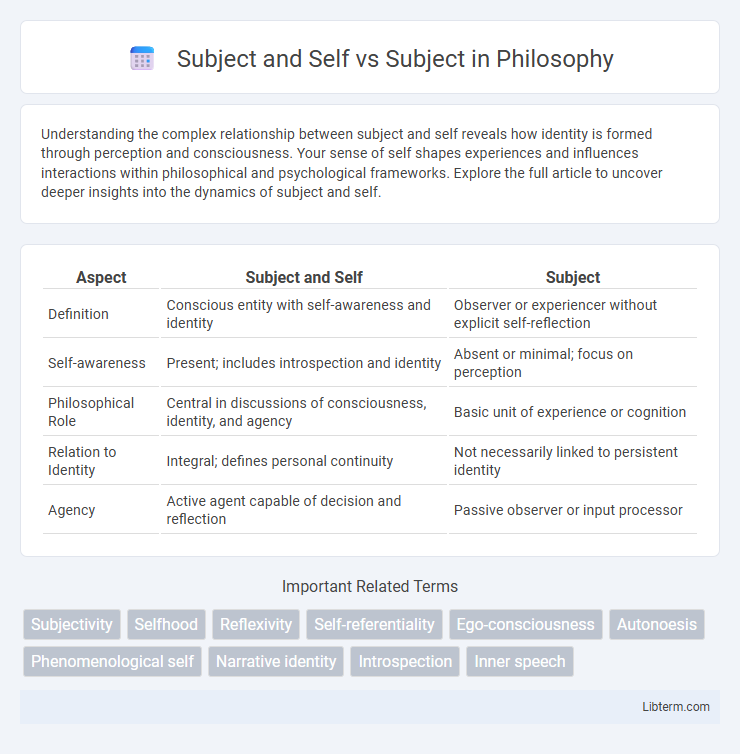Understanding the complex relationship between subject and self reveals how identity is formed through perception and consciousness. Your sense of self shapes experiences and influences interactions within philosophical and psychological frameworks. Explore the full article to uncover deeper insights into the dynamics of subject and self.
Table of Comparison
| Aspect | Subject and Self | Subject |
|---|---|---|
| Definition | Conscious entity with self-awareness and identity | Observer or experiencer without explicit self-reflection |
| Self-awareness | Present; includes introspection and identity | Absent or minimal; focus on perception |
| Philosophical Role | Central in discussions of consciousness, identity, and agency | Basic unit of experience or cognition |
| Relation to Identity | Integral; defines personal continuity | Not necessarily linked to persistent identity |
| Agency | Active agent capable of decision and reflection | Passive observer or input processor |
Defining the Subject: A Foundational Overview
Defining the subject involves identifying the core entity around which meaning and action revolve, distinguishing it from the self, which represents personal identity and consciousness. The subject serves as the primary point of reference in language, philosophy, and cognitive sciences, whereas the self encapsulates individual experiences and self-awareness. Understanding this distinction is foundational for exploring agency, subjectivity, and the nature of personal identity in various disciplines.
Understanding the Self in Relation to the Subject
Understanding the self in relation to the subject involves recognizing the self as both an experiencing agent and a reflective entity within subjective experience. The subject represents the locus of consciousness and perception, while the self encompasses the identity and continuity across experiences. Exploring this distinction clarifies how personal identity emerges from subjective awareness and cognitive processes.
Subject vs. Subject: Comparative Perspectives
Subject versus Subject perspectives emphasize the relational dynamics where each individual is recognized as a self-conscious agent rather than an object. This comparative approach explores intersubjectivity, highlighting mutual recognition and dialogue as foundational to authentic human interaction. By contrasting Subject-Self frameworks with Subject-Subject models, philosophy and psychology reveal how shared meaning and co-constructed realities emerge through equality rather than hierarchical self-other distinctions.
Theoretical Approaches to Subject and Self
Theoretical approaches to Subject and Self explore the dynamic interplay between identity formation and consciousness, emphasizing distinctions between the 'subject' as a perceiving agent and the 'self' as an embodied, social construct. Psychoanalytic theories, such as those of Lacan, highlight the fragmented nature of the subject, while phenomenologists like Husserl focus on the self's first-person perspective and lived experience. Post-structuralist frameworks critique the fixed notions of subjectivity, proposing fluid, decentered versions of the self shaped by language, culture, and power relations.
The Role of Self-Awareness in Subjectivity
Self-awareness fundamentally shapes subjectivity by enabling individuals to recognize their own thoughts, emotions, and biases within experiences. This metacognitive ability allows for deeper introspection and differentiates personal perspectives from external realities. Enhanced self-awareness enriches the understanding of the subject's role in constructing meaning and interpreting the world.
Historical Evolution of Subject and Self Concepts
The historical evolution of the subject and self concept reveals a shift from classical philosophy's view of the subject as a passive entity to modern interpretations emphasizing self-awareness and agency rooted in Descartes' cogito. In the 19th and 20th centuries, thinkers like Hegel and Freud further developed the self as a dynamic process shaped by social, psychological, and unconscious forces, contrasting earlier static notions. This transformation illustrates how the subject evolved from a fixed metaphysical presence to a fluid, relational construct central to contemporary understanding of identity and consciousness.
Subjectivity in Philosophy: Key Debates
Subjectivity in philosophy revolves around the distinction between the Subject and the Self, where the Subject refers to the conscious perceiver engaged in experience, while the Self encompasses the unified identity or essence underlying those experiences. Key debates explore how subjectivity constructs reality, questioning whether the Self is an independent entity or a product of linguistic, psychological, and social frameworks. Philosophers like Descartes emphasize the primacy of the thinking Subject, whereas modern phenomenologists analyze the fluid and relational nature of the Self in constituting subjective experience.
Identity Construction: Self vs. the External Subject
Identity construction involves an ongoing negotiation between the self, representing personal consciousness and internal experience, and the external subject, comprised of societal roles and external perceptions. The self actively interprets and redefines these external influences to maintain coherence and authenticity in identity formation. This dynamic interaction highlights how identity is not fixed but continuously shaped through the interplay of internal self-awareness and external social subjectivity.
Practical Implications of Subject and Self Distinctions
Distinguishing between Subject and Self enhances personal accountability and self-awareness in psychological therapy and cognitive behavioral practices. Recognizing the Subject as the perceiver and the Self as the experiencer facilitates mindfulness techniques, promoting mental clarity and emotional regulation. This distinction aids in resolving identity conflicts and improving interpersonal communication by clarifying internal versus external perspectives.
Future Directions in Subject and Self Scholarship
Future directions in Subject and Self scholarship emphasize integrating interdisciplinary approaches from cognitive science, philosophy, and neuroscience to deepen the understanding of selfhood and subjectivity. Emerging research prioritizes the exploration of digital identity, embodiment, and the impact of artificial intelligence on self-perception and subject formation. Advancements in neurophenomenology and computational modeling aim to clarify the dynamic processes underlying the continuous construction and experience of the subject and self in changing social contexts.
Subject and Self Infographic

 libterm.com
libterm.com